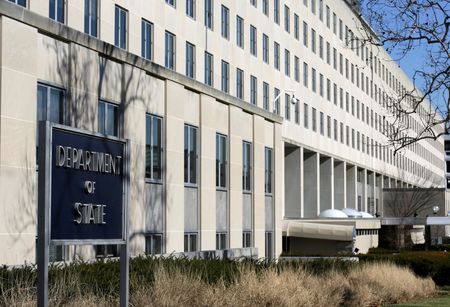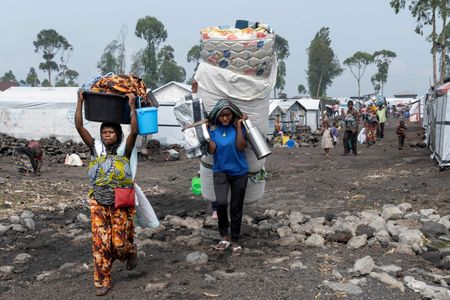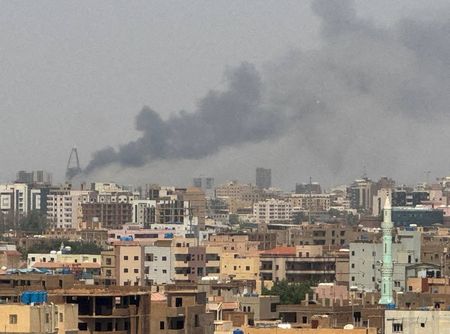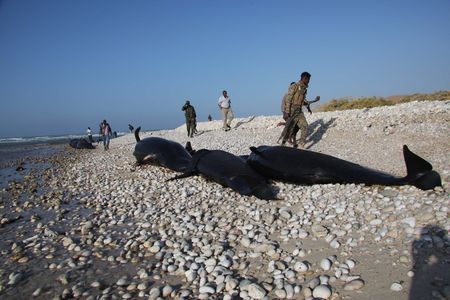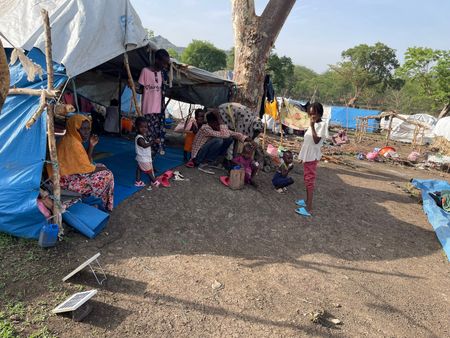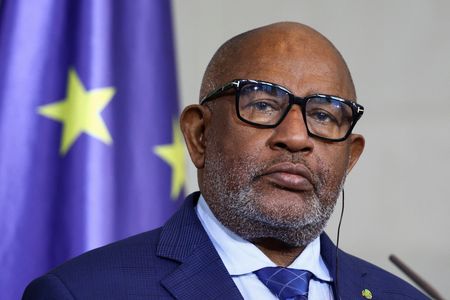By Humeyra Pamuk and Daphne Psaledakis
WASHINGTON (Reuters) -The U.S. State Department issued a “stop-work” order on Friday for all existing foreign assistance and paused new aid, according to a cable seen by Reuters, after President Donald Trump ordered a pause to review if aid allocation was aligned with his foreign policy.
The cable, drafted by the Department’s foreign assistance office and approved by Secretary of State Marco Rubio, said waivers have been issued for military financing for Israel and Egypt. No other countries were mentioned in the cable.
The move risks cutting off billions of dollars of life-saving assistance. The United States is the largest single donor of aid globally – in fiscal year 2023, it disbursed $72 billion in assistance.
Just hours after taking office on Monday, Trump ordered a 90-day pause in foreign development assistance pending a review of efficiencies and consistency with his foreign policy but the scope of the order was not immediately known.
The State Department cable said effective immediately, senior officials “shall ensure that, to the maximum extent permitted by law, no new obligations shall be made for foreign assistance” until Rubio has made a decision after a review.
It says that for existing foreign assistance awards stop-work orders shall be issued immediately until reviewed by Rubio.
“This is lunacy,” Jeremy Konyndyk, a former USAID official who is now president of Refugees International, said. “This will kill people. I mean, if implemented as written in that cable … a lot of people will die.”
“There’s no way to consider this as a good-faith attempt to sincerely review the effectiveness of foreign assistance programming. This is just simply a wrecking ball to break as much stuff as possible,” Konyndyk said.
Trump’s order is unlawful, argued a source familiar discussions in Congress on the move.
“Freezing these international investments will lead our international partners to seek other funding partners – likely U.S. competitors and adversaries – to fill this hole and displace the United States’ influence the longer this unlawful impoundment continues,” the source said on condition of anonymity.
WAIVERS
A USAID official, who requested anonymity, said officers responsible for projects in Ukraine have been told to stop all work. Among the projects that have been frozen are support to schools and health assistance like emergency maternal care and childhood vaccinations, the official said.
Across the board, “decisions whether to continue, modify, or terminate programs will be made” by Rubio following a review over the next 85 days. Until then Rubio can approve waivers.
Rubio has issued a waiver for emergency food assistance, according to the cable. This comes amid a surge of humanitarian aid into the Gaza Strip after a ceasefire between Israel and Palestinian militants Hamas began on Sunday and several other hunger crises around the world, including Sudan.
But Konyndyk said emergency food assistance was just a minority of all humanitarian assistance, adding that nutrition, health and vaccination programs will have to stop, as would relief aid to Gaza and Syria as well as services to refugee camps in Sudan.
“It’s manufactured chaos,” said a former senior official with the U.S. Agency for International Development (USAID), speaking on condition of anonymity.
“Organizations will have to stop all activities, so all lifesaving health services, HIV/AIDS, nutrition, maternal and child health, all agriculture work, all support of civil society organizations, education,” said the official.
The State Department cable also said waivers have so far been approved by Rubio for “foreign military financing for Israel and Egypt and administrative expenses, including salaries, necessary to administer foreign military financing.”
Israel receives about $3.3 billion in foreign military financing annually, while Egypt receives about $1.3 billion
Other states identified for such financing in 2025 include Ukraine, Georgia, Estonia, Latvia, Lithuania, Taiwan, Indonesia, the Philippines, Thailand, Vietnam, Djibouti, Colombia, Panama, Ecuador, Israel, Egypt and Jordan, according to a request to Congress from former President Joe Biden’s administration.
That request also said foreign military financing would “also seek to bolster the Lebanese Armed Forces’ ability to mitigate instability and counter malign Iranian influence.”
The Lebanese military is currently trying to deploy into the south of the country as Israeli troops withdraw under a ceasefire deal that requires Iran-backed Hezbollah weapons and fighters to also be removed from the area.
(Additional reporting by Patricia Zengerle, Daphne Psaledakis and Simon Lewis; Writing by Michelle Nichols; Editing by Alistair Bell, Nick Zieminski and Daniel Wallis)

